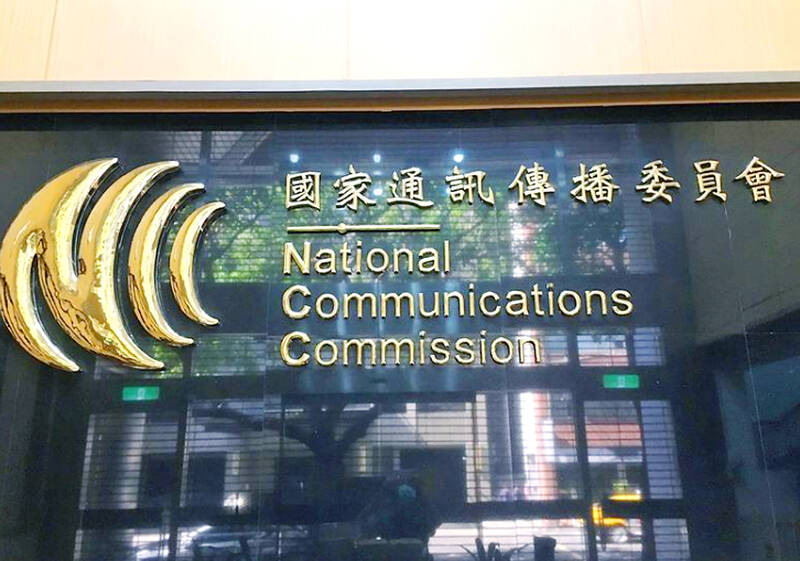EMAG Technology could face a maximum fine of NT$1.2 million (US$39,056) for illegally importing an uncertified gaming smartphone into Taiwan, the National Communications Commission (NCC) said yesterday.
EMAG Technology, also known as MiClub, in March launched a fundraising plan on FlyingV — a Taipei-based fundraising platform — to import the RedMagic 8 Pro into the country.
A total of 1,022 people participated in the plan, which had accumulated more than NT$23 million.

Photo: Yang Mien-chieh, Taipei Times
The scheme last month came to the attention of the smartphone regulator after some gamers complained to local news media that they had yet to receive their orders.
Although some people received smartphones last week, they soon discovered that the smartphone would display the location as “Taiwan, China,” when a call was made or received.
The RedMagic 8 Pro has yet to be certified and verified as a safe radio frequency device, the commission yesterday said in a statement, adding that it would issue penalties according to the Telecommunications Management Act (電信管理法) after collecting evidence.
EMAG Technology could face a fine of up to NT$1 million for importing the gaming smartphone without securing approval from the NCC, the commission said.
It could face an additional fine of NT$200,000 for selling an uncertified and unverified smartphone, it added.
The fine would be finalized at the NCC commissioners’ meeting, it said.
NCC specialist Wang Chih-yuan (王智遠) told the Taipei Times that people can bring radio frequency devices into the country for personal use, but there is a limited number allowed per person and the device must have already been certified and verified by the NCC.
“From what we have seen so far, MiClub appeared to accept the funds from different individuals, import devices from overseas on their behalf and distribute devices to individuals who participated in the fundraising plan. In that case, they need to secure a permit for import first,” he said.
The NCC has yet to receive requests for certification and verification for the RedMagic 8 Pro from EMAG or other parties, he said.
Meanwhile, FlyingV is to be asked to take down any fundraising plan involving the sale of uncertified radio frequency devices, he said.
Should the RedMagic 8 Pro pass the certification and verification tests, the manufacturer or the agent would be asked to address the problem that the smartphone displays Taiwan as part of China, which is detrimental to national dignity, Wang said.
“Should the situation persist, we could abolish the certificate issued to them and ban the smartphone from being sold in Taiwan, as per the Regulations Governing Compliance Approval for Controlled Telecommunications Radio-Frequency Devices (電信管制射頻器材審驗管理辦法),” Wang said.
Using smartphones that are not certified by the NCC could affect the safety of other electronic appliances, disrupt radio waves, and generate concerns for personal data and cybersecurity breaches, the commission said, adding that consumers should ensure that the smartphones they purchase have been certified by the NCC.
The commission said it would coordinate with the Consumer Protection Committee and the Ministry of Digital Affairs to handle consumer disputes generated by the fundraising plans.
In 2019, Chinese smartphone manufacturer Huawei Inc was asked to stop sales of its P30, P30 Pro and Nova 5T smartphones in Taiwan after a system update led them to refer to the nation as “Taiwan, China,” rather than “Taiwan,” in the caller’s location and warranty areas.

The Ministry of Economic Affairs has fined Taobao NT$1.2 million (US$36,912) for advertisements that exceed its approved business scope, requiring the Chinese e-commerce platform to make corrections in the first half of this year or its license may be revoked. Lawmakers have called for stricter enforcement of Chinese e-commerce platforms and measures to prevent China from laundering its goods through Taiwan in response to US President Donald Trump’s heavy tariffs on China. The Legislative Yuan’s Finance Committee met today to discuss policies to prevent China from dumping goods in Taiwan, inviting government agencies to report. Democratic Progressive Party Legislator Kuo Kuo-wen (郭國文) said

The Ministry of Economic Affairs has fined Taobao NT$1.2 million (US$36,900) for advertisements that exceeded its approved business scope and ordered the Chinese e-commerce platform to make corrections in the first half of this year or its license would be revoked. Lawmakers have called for stricter supervision of Chinese e-commerce platforms and more stringent measures to prevent China from laundering its goods through Taiwan as US President Donald Trump’s administration cracks down on origin laundering. The legislature’s Finance Committee yesterday met to discuss policies to prevent China from dumping goods in Taiwan, inviting government agencies to report on the matter. Democratic Progressive Party

Taiwan and its Pacific ally Tuvalu on Tuesday signed two accords aimed at facilitating bilateral cooperation on labor affairs, according to Taiwan’s Ministry of Foreign Affairs (MOFA). The governments inked two agreements in Taipei, witnessed by Foreign Minister Lin Chia-lung (林佳龍) and visiting Deputy Tuvaluan Prime Minister Panapasi Nelesone, MOFA said in a news release. According to MOFA, the agreements will facilitate cooperation on labor issues and allow the two sides to mutually recognize seafarers’ certificates and related training. Taiwan would also continue to collaborate with Tuvalu across various fields to promote economic prosperity as well as the well-being of their

Sung Chien-liang (宋建樑), who led efforts to recall Democratic Progressive Party (DPP) Legislator Lee Kun-cheng (李坤城), was released on bail of NT$80,000 today amid outcry over his decision to wear a Nazi armband to questioning the night before. Sung arrived at the New Taipei District Prosecutors’ Office for questioning in a recall petition forgery case last night wearing a red armband bearing a swastika, carrying a copy of Adolf Hitler’s Mein Kampf and giving a Nazi salute. Sung left the building at 1:15am without the armband and covering the book with his coat. Lee said today that this is a serious